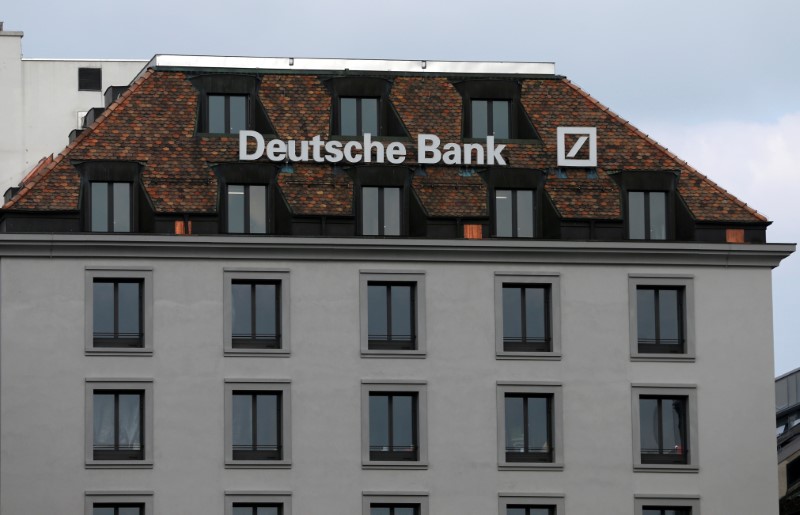By Olivia Oran, Arno Schuetze and Anjuli Davies
NEW YORK/FRANKFURT (Reuters) - Deutsche Bank (DE:DBKGn) is replacing its U.S. chief Bill Woodley with the global head of its stock-trading business, Thomas Patrick, people close to the matter said, in a sign of its intent to restructure its Wall Street business.
The bank announced earlier this month that Chief Executive John Cryan would personally oversee the bank's U.S. business after paying $7.2 billion to settle an investigation into its selling of toxic U.S. mortgage-backed securities in the run-up to the financial crisis.
Patrick, who was appointed head of global markets equities in late 2015, will take over from Woodley in the coming weeks, one of the people said.
Woodley, who joined Deutsche Bank in 1998, was previously deputy CEO of Deutsche Bank Americas. Prior to that, he was the global chief operating officer for regional management from 2010 to 2013 and the regional chief operating officer for Asia Pacific based in Hong Kong.
Deutsche Bank declined to comment.
A planned 8 billion-euro ($8.5 billion) capital increase and a stock market listing of Deutsche Bank's asset management business will replenish the lender's capital reserves but also free up funds for potential investments in its core business of investment banking, which has lost market share to Wall Street rivals.
Since a push into investment banking starting in the late 1990s, trading activities have mostly been the main driver of earnings at Deutsche Bank, which views its U.S. performance as vital for the bank's success.
Key to that strategy is growing Deutsche Bank's cash-cow bond trading business, which Cryan says he will invest in even as he continues to cut costs, reduce staff and zero in on bonuses.
"I would like to stress that we are proud of our capital market expertise and the strong business we have with many institutional clients. That expressly includes the US market and Asia-Pacific," Cryan said in a note to staff on March 6.
Any investment bank with global ambitions needs to have a large Wall Street presence given America is the most lucrative market for investment banking fees and home to the world's largest institutional investors.
While U.S. investment banks moved quickly to restructure and recapitalize after the financial crisis, European players are still struggling with cost-cutting and shoring up their balance sheets, as Deutsche Bank's latest strategy revamp shows, leaving them less able to compete on Wall Street.
In 2016, Deutsche Bank lagged both European and U.S. peers who benefited from a bounce in bond trading, with revenues up 9 percent year-on-year against a 43 percent rise for U.S. peers and a 15 percent rise at European peers, Goldman Sachs (NYSE:GS) analysts estimate.
The German lender is now aiming to rank in the top five globally for FICC (fixed income, currencies and commodities) and top three in Europe.
"The footprint reduction and the product reduction has come to a halt. What we have today we will invest in," Cryan had said.
NO LONGER FLOW MONSTER
A person close to Deutsche Bank's investment banking strategy said that Deutsche Bank would no longer try to be a "flow monster", offering all services to all markets in the United States.
"It’s all about niche products. There’s a decent return from these businesses but it also consumes a lot of capital," the person said
Seb Walker at data analytics firm Tricumen said that banks who were patient and waited through a couple of years of weak FICC business now stand to benefit from a rebound.
"It's clear the spoils are returning with U.S. interest rate rises and the volatility surrounding the Trump presidency. But it's a stack 'em high, sell 'em cheap market in the US. Deutsche bank used to be strong at that but it's the same point around challenging the Americans," Walker said.
Deutsche's global markets business has seen a strong start to the year with debt sales and trading revenues up 30 percent year-on-year. But the dilemma is how to grow whilst also shrinking.
Deutsche Bank said it is aiming to cut about 20 billion euros of legacy assets, including long-term rates, credit and derivatives positions from its sales and trading business.
The bank has also scrapped bonuses for 2016 for most of its staff, weighing on morale amongst employees who are meant to be driving the revamp.
"There is a huge morale problem this year because so many people got zero bonuses and they’re trying to bring in people from other banks with big packages," a manager at Deutsche's investment bank said, adding that staff currently had no clear understanding of who their bosses are.
Deutsche Bank lacks the U.S. commercial bank clients of its Wall Street peers, meaning it has to focus on the institutional investor base where competition is greatest.
"It’s also the market where increased transparency and electronification will continue to drive margins down. Deutsche can do it on the revenue side but not on the cost side," said Tricumen's Walker.
That leaves more efficiency gains through technology, an area in which Deutsche has been struggling to get up to speed after its rapid expansion in investment banking resulted in the creation of a highly complex and inefficient IT system.
"Deutsche Bank hasn’t been bad at generating revenues. The challenge now is to do that in an environment where cost-cutting is important but American banks now have a big head start," a source close to the matter said.
"BAML (Bank of America Merrill Lynch (NYSE:BAC)) started its technology transformation in 2010. Deutsche in 2015. They are five years behind the technology challenge," the person said.
